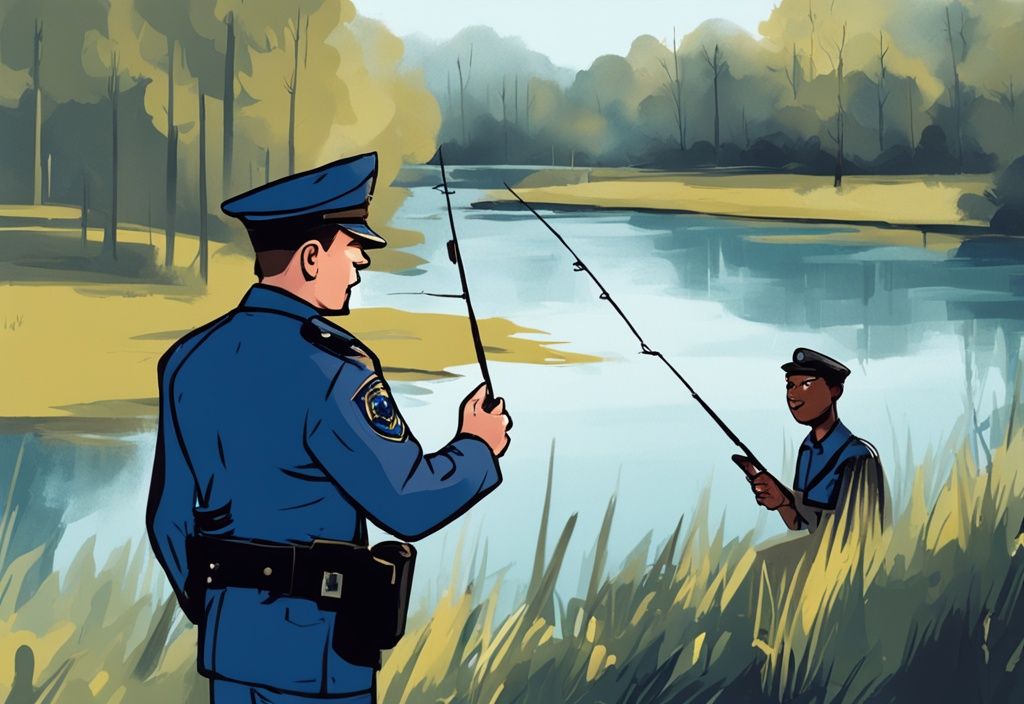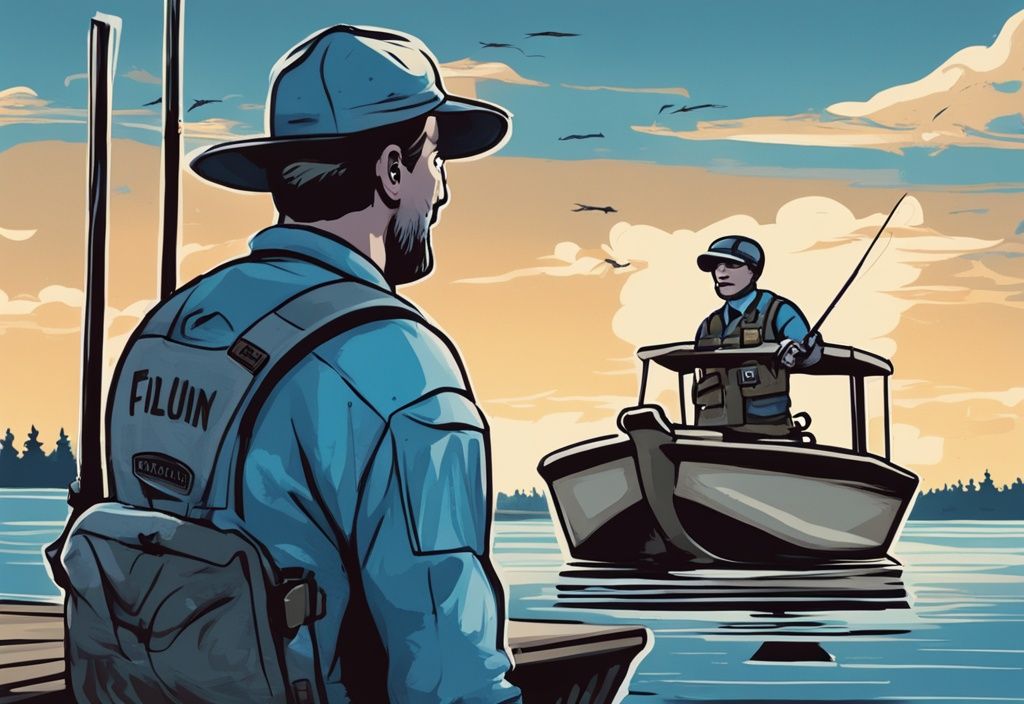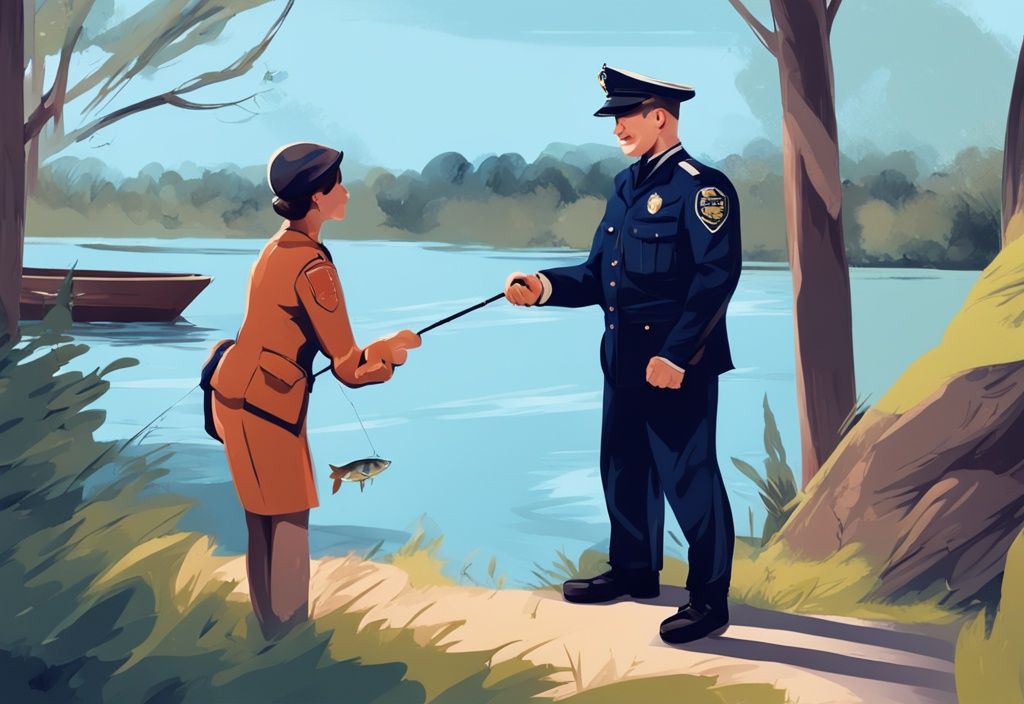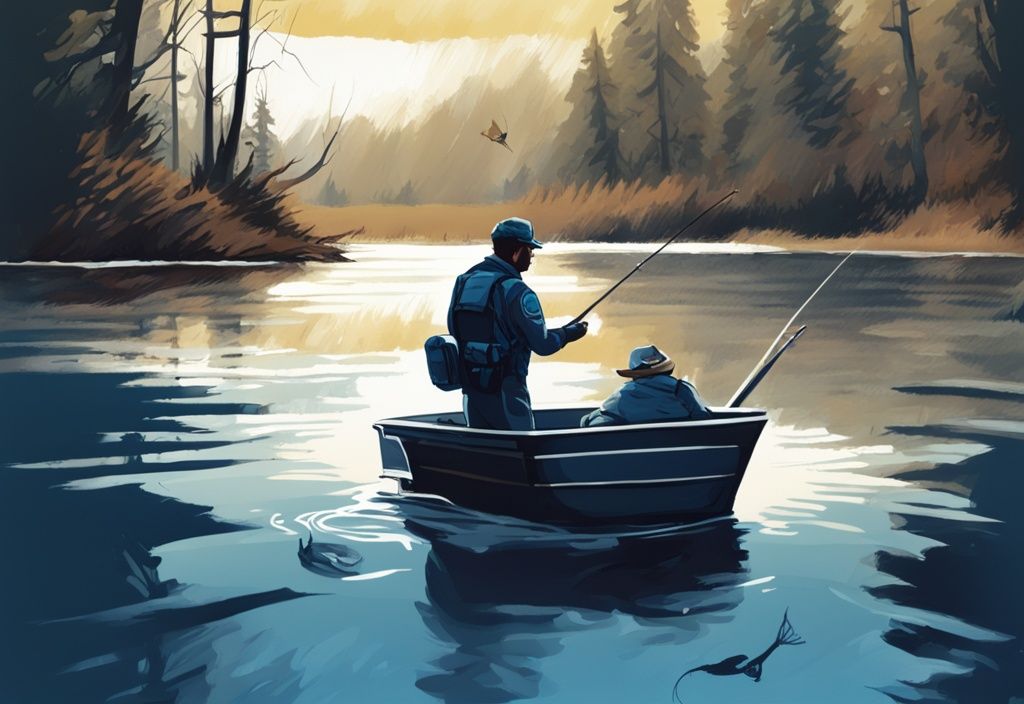Ever fantasized about skipping the fishing license just for a day? Imagine a sunny morning by the dock, casting a line into the crystalline water—only to be interrupted by a uniformed officer. Uh oh! Caught fishing without a license, now what?
Fines? Jail time? That’s right, my friend. The consequences can be seriously harsh, varying as widely as the fishes in the sea, depending on your location. So, is the risk worth it? I don’t think so!
In this piece, you’ll dive deep into the legal binds, the state-by-state differences, and crucial steps to follow if you’re caught in this net. Stay ahead of the game by staying informed, and most importantly, fishing responsibly. So, ready for the reel truths about fishing sans license? Let’s dive in!
What Happens If You Get Caught Without a Fishing License? Consequences of Fishing Without a License
Getting caught without a fishing license isn’t just a slap on the wrist—it’s a serious matter that comes with hefty consequences. The exact penalties can vary based on where you are and the nature of your offense, but the fallout can hit your wallet hard and even threaten your freedom.
Common Penalties and Fines
Fishing without a license is like casting your line into trouble. Depending on the location and circumstances, you could face fines ranging from a modest $15 to a staggering $12,000. The specifics? Well, they consider how many fish you’ve caught and what types. In many states, you’re fined per fish—anywhere from $5 to $1,000 for each unlicensed catch.
If it’s your first time, you might just get a warning. But don’t get too comfortable. Repeat offenses or severe violations can lead to much steeper fines, misdemeanor charges, and yes, even arrest.
State-by-State Breakdown of Fines
Each state in the U.S. has its own rules and penalties for fishing without a license, so let’s break it down.
California
In California, the penalties are no joke. You could be looking at fines between $485 and $1,000, plus an eye-popping $1,000 for each fish you snag illegally. And that’s not all—court fees can pile on, and in the worst cases, you might even face jail time. It’s a stark reminder to always check the local licensing requirements before you reel in that first catch.
Massachusetts
While Massachusetts might be a tad more lenient than California, the state still takes unlicensed fishing seriously. Get caught, and you could be fined between $50 and $100, plus an additional $5 for each fish. Have an endangered species in your catch? The fine could soar to $2,000. And let’s not forget about the potential 30-day jail time for more severe offenses.
Florida
Down in Florida, you’re looking at a bit of a different setup. If you’re caught fishing without a license, you’ll pay the cost of the license itself plus an extra $50. And if you’re a repeat offender within a 36-month period, tack on another $100. Fail to pay these fines, and you might face an additional $500 penalty and up to 60 days in jail. It’s clear—Florida is not messing around with its zero-tolerance policy.
North Carolina
North Carolina’s approach involves fines ranging from $35 to $500. Plus, there’s the possibility of jail time, up to 30 days. What’s more, reciprocal agreements with neighboring states (except South Carolina) mean unlicensed fishing here can have broader consequences. Anglers need to stay compliant to avoid these hefty penalties and potential legal entanglements across state lines.
Fishing without a license can quickly turn your peaceful day by the water into a legal nightmare. Remember to always secure the proper licenses before casting off, no matter which state you’re fishing in—it’s just not worth the risk.

Additional Penalties and Legal Ramifications
Possible Jail Time
Depending on the state, refusing to pay fines for fishing without a license can escalate to jail time. Jail sentences for such violations vary, with some states imposing penalties of up to 60 days. In situations where the violator ignores court orders or fails to comply with imposed fines, a custodial sentence may be enforced to ensure compliance.
Court Appearances and Lawsuit Fees
Receiving a citation for fishing without a license often requires a mandatory court appearance. Especially in states like Florida, these court appearances are crucial. Failing to show up can result in severe penalties, including additional fines and the possibility of jail time.
Moreover, legal fees associated with lawsuits stemming from such violations can add a financial burden. It emphasizes the importance of attending court dates to avoid exacerbating the situation.
Confiscation of Fishing Gear
Law enforcement authorities have the right to confiscate fishing gear when someone is caught fishing without a license. The extent of confiscation can range from basic equipment like rods and reels to more valuable assets like boats, particularly in severe cases.
This confiscation serves as both a penalty and a deterrent, underscoring the importance of adhering to fishing regulations.
Impact on Fishing and Hunting Licenses
Getting caught fishing without a license can have long-term repercussions on one’s eligibility for future fishing and hunting licenses. In certain states, violations can result in points being added to your license, which can negatively affect future applications.
Repeat offenses are treated more harshly, potentially leading to longer suspension periods or, in extreme cases, a lifetime fishing ban. This can severely limit opportunities for enjoying these outdoor activities, highlighting the need for obtaining and maintaining proper licensing.
Factors Influencing Penalties
When it comes to fishing without a license, the repercussions can vary widely. Let’s dive into the factors that influence how severe these penalties can be.
First Offense vs. Repeat Offenders
Getting caught without a fishing license has different consequences depending on whether it’s your first time or if you’ve been snagged before. For first-time offenders, the law tends to be more forgiving—often issuing a warning or a lighter penalty.
But if you get caught without a fishing license again, it’s a whole different story. Repeat offenders face heftier fines, longer suspensions of their fishing privileges, and even more severe legal fallout. Trust me, it’s not worth the risk.
Number and Type of Fish Caught
Another key factor is the number and type of fish you have in your cooler. If you’re caught with a lot of fish or species that are protected, the fines are going to be steeper. Authorities aren’t just counting fish; they’re also looking at what you’re catching.

Endangered species? High penalties. Over the catch limit? Even higher. These violations don’t just impact your wallet—they can lead to stricter legal actions and long-term bans on future fishing licenses.
Fishing in Restricted Areas or During Off-Season
Where and when you fish can also dramatically affect your penalties. Fishing in restricted areas or during the off-season? Expect significantly higher fines. Violating rules about restricted zones or designated times of the year is a big no-no.
These infractions signal a disregard for conservation efforts and compliance with the law. Add in violations like breaching size and bag limits, and you’re looking at even bigger troubles—bigger fines and potentially serious legal consequences. Penalties here are designed to underscore the importance of sticking to guidelines that ensure sustainable fishing.
What Happens If You Get Caught Without a Fishing License
First Response Actions
Picture this: You’re out on the water, the sun’s warm on your back, and suddenly, you’re approached by an officer. It’s vital to stay calm and courteous. Think of it like handling a big catch—steady and gentle wins the day. Provide any requested identification like your name and address promptly. Your cooperation here is akin to respecting the fish you catch; it shows respect for the process and can sometimes soften the potential outcome.
Dealing with Authorities
Avoid the urge to argue or resist when dealing with law enforcement. Accept the citation or warning with the same grace you would handle a slippery fish. Show your willingness to comply with the regulations. Imagine the officer as just another guardian of the waters, doing their job to maintain the balance. Being respectful can go a long way in such interactions, saving you from more substantial headaches down the line.
Understanding Legal Rights
Knowledge is your best bait here. Understand your legal rights when you receive a citation for fishing without a license. Each state has its specifics, and knowing these can help you better navigate any legal proceedings. If the violation seems murky like a deep-water swim, don’t hesitate to seek legal advice. This informed approach can help you make smart decisions and dodge unnecessary penalties. Remember, just like in fishing, the more you know, the better you fare.
How to Avoid Getting Caught
Understanding Fishing License Requirements
Knowing what happens if you get caught without a fishing license can be a major bummer. Trust me, you don’t want to find out the hard way. Each state in the U.S. has its own set of rules and regulations when it comes to fishing licenses. This isn’t just about giving you a hard time; these rules help manage and protect our precious water bodies.
Each state tailors its regulations to suit their local environment. So, whether you’re casting your line into freshwater rivers or saltwater oceans, the requirements can vary widely. Some states even have different licenses for different age groups, or specific licenses for certain types of water bodies like lakes and coastal areas. It’s always smart to do your homework before planning your fishing trip. Regulations can vary within a state, sometimes down to individual lakes and rivers.
Knowing the specifics for your fishing location is equally critical. Every body of water can have its own unique rules about fishing seasons, catch limits, and protected species. For more information on why these regulations are essential, check out this resource on [how fishing regulations work](https://www.nps.gov/subjects/fishing/how-regulations-work.htm). Do yourself a favor and make a habit of checking local regulations for the area you plan to fish. This not only keeps you on the right side of the law but also ensures you’re respecting conservation efforts and helping to sustain aquatic ecosystems. Regulations can change, sometimes seasonally or annually, so staying updated is essential.

How to Obtain a Fishing License
Getting a fishing license isn’t rocket science, but it’s crucial to go through the official channels. Each state’s wildlife agencies offer licenses that you can buy either in person or online. Make sure you’re on the official state website or a reputable third-party service that the state authorizes. Not only does this secure your legal right to fish, but it also helps fund local conservation efforts through the license fees.
Many states offer discounted or free licenses to certain groups. Seniors, veterans, and disabled individuals often qualify for these perks, which makes it easier for them to enjoy fishing. It’s worth checking with your state’s wildlife agency to see if you’re eligible for any discounts or special licensing provisions. This information is typically available on their website, complete with detailed guidelines on how to apply.
By following these guidelines and making sure you have the correct license, you can steer clear of the harsh penalties for fishing without one. This not only keeps you compliant with the law but also enhances your fishing experience by promoting responsible and sustainable practices. After all, the joy of fishing is best enjoyed without the worry of hefty fines or other legal troubles.
FAQ
If you’re wondering what happens if you get caught without a fishing license, you’re in the right place. Let’s dive into the particulars with a splash of my two decades of casting lines and maybe a chuckle or two along the way.
Are there any states where fishing without a license is more severely punished?
Yes, states like California and Florida have stricter penalties. They don’t mess around when it comes to protecting their waters. In California, for instance, the fines can reach from $485 to $1,000, plus some extra for each illegal fish. That’s enough to make you think twice before skipping that license! Florida’s no different—if you get caught, you’ll have to cough up the cost of the license plus some hefty fines, especially if you decide to make it a habit. Trust me, it’s not worth the risk.
Can refusal to pay fines for fishing without a license really result in jail time?
Yes, refusal to pay fines can result in jail time. It sounds a bit dramatic, doesn’t it? But it’s true. Ignoring those fines can land you some quality time behind bars—30 to 60 days depending on the state and how severe your offense is. Some states are downright strict about it, ensuring you’re taught a lesson in compliance. So, save the jail cell for actual criminals and just pay the fine.
How can I find out if I am exempt from needing a fishing license?
Exemptions vary by state. The rules can be as varied as the fish in your favorite lake. Typically, kids under 16, seniors, disabled folks, and active military personnel might just get a free pass. But don’t take my word for it. Check your local state regulations and wildlife agency guidelines to see if you’re one of the lucky ones.
What are the costs associated with obtaining a fishing license?
Fishing license costs vary from $20 to $30 annually. The exact price depends on your state and whether you’re heading for freshwater or saltwater. Many states even offer discounts for seniors, veterans, and disabled individuals. So it pays to dig around a bit and find out what specific rates and deals are available where you’re fishing.


